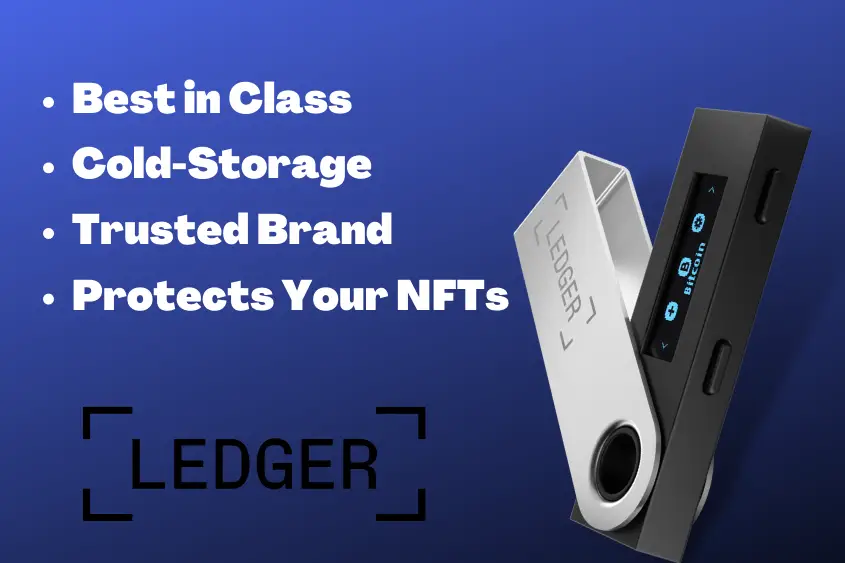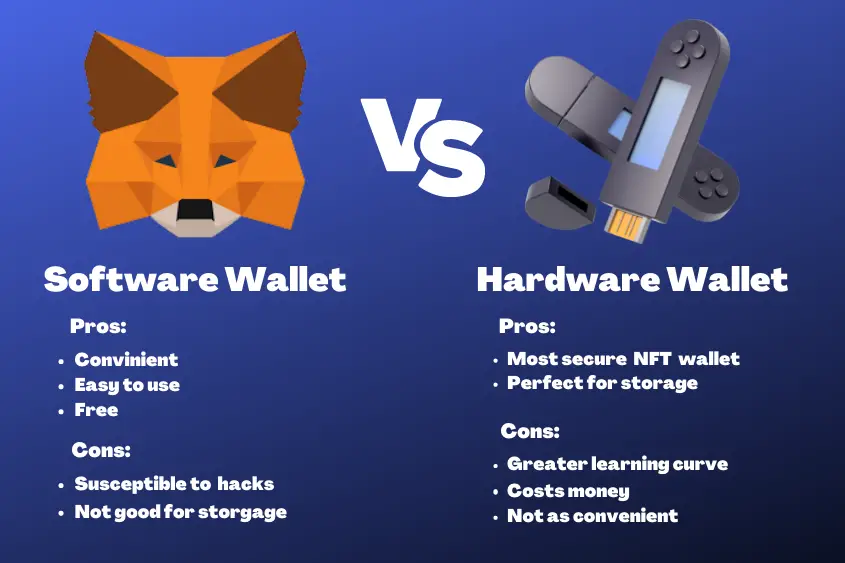As if the NFT space isn’t scary enough, trying to figure out which wallet is the safest for storing your NFTs is even more stressful. Considering we spend a significant amount of money buying digital assets, it’s important that we store them safely. So what is the safest NFT wallet?
The Ledger Nano X is the safest NFT wallet. It stores your secret phrase, password, and pin offline so that your assets remain secure, and it reduces the risk of your wallet being compromised. It’s also easy to use, inexpensive, and manufactured by the most trusted wallet brand in the industry.
Even though the Ledger Nano X is one of the best NFT wallets, there are still other types of wallets you might want to consider. Also, there are plenty of tips to take note of in order to help keep any wallet safe. Below I will cover it all.
What NFT Wallet Should You Get?
If you are looking for the safest wallet that won’t break your budget, then I can’t recommend the Ledger Nano X enough. Ledger has a solid reputation in the crypto community and is often referred to as the best wallet manufacturer. For only $149, this device will keep your NFTs as safe as possible.

Considering Ledger was founded in 2014, its team of over 130 employees has extensive knowledge in embedded securities, cryptocurrency, and of course NFTs.
Ledger manufactures cold-storage wallets, also known as hardware wallets. These wallets are the most secure type of wallet because they store all of your wallet’s info on the device, and most importantly offline.
The greatest security risk when it comes to a wallet is having it connected to the internet. Technically, the only way for hackers and scammers to gain access to your wallet and the assets within is by accessing it themselves.
To do this, they use a variety of scams that trick the user into giving them access to their wallet. Once a scammer gains access, they can quickly send all of your digital assets to their own wallet. From there, they liquidate all of your assets as quickly as possible and then cash out.
According to the US Federal Trade Commission, over $1 billion worth of digital assets has been stolen from more than 46,000 users via insecure NFT ownership, since 2021. Those are some scary numbers.
What’s even more terrifying is that a majority of the NFTs that have been compromised could have been avoided if the holders had invested in a hardware wallet.
Software Wallet vs. Hardware Wallet
Knowing which type of wallet is best for you and your situation is important. There are two kinds of wallets used to store NFTs: A software wallet (like Metamask), and a hardware wallet (like Ledger).

Let’s look at the main differences between the two.
Software wallet
A software wallet is a program that you install on your mobile device or computer. Below are some of the main pros and cons of software wallets:
Pros:
- Convenient and easy to use
Software wallets like Metamask are convenient because you can access them by simply downloading an app on your mobile device or installing the Google Chrome extension on your desktop. Additionally, there’s not a huge learning curve to set one up. All you need to do is create your profile and jot down your seed phrase and password.
- Great for transactions
Software wallets are a great option for quickly transacting. Whether you’re sending someone crypto or buying an NFT, it’s a lot quicker to sign into an app than having to pull out a physical wallet.
- Free to download
Unlike a hardware wallet, software wallets are free to download and use. There’s no upfront cost or subscription fees. Simply download it, create your account, and you’ve got a wallet.
Cons:
- More susceptible to being hacked
Since hardware wallets are often connected to the internet, your risk of being hacked while using one is higher. Although software wallets like Metamask might be an okay option for purchasing NFTs, you should never store your assets on them.
- Can contain malicious code
Software wallets are created by developers who publish them to the public for use. But just because developers have good intent, doesn’t mean a hacker with malicious intent can’t gain access to the software’s code and change it in their favor.
In fact, this has already happened to Solana-based wallets. In August 2022, over 8,000 internet-connected software wallets were compromised. This resulted in over $5 million worth of SOL, SPL, and other Solana-based assets being stolen from unsuspecting users.
That being said, no hardware wallets were affected by the hack.
- Not great for storing NFTs and other digital assets
Due to software wallets being more susceptible to hacks, they are not a good option for storing any of your digital assets long-term. If you purchase an NFT using a software wallet, you should instantly transfer it to a hardware wallet for safe storage.
Hardware Wallet
A hardware wallet is a device that is used to store your wallet’s access info offline. Below are some of the main pros and cons of hardware wallets:
Pros:
- Most secure crypto wallet on the market
Hardware wallets like Ledger are the most secure wallet you can get your hands on. If you want the best line of defense for your NFTs, look no further. Not only do hardware wallets store all of your wallet’s info offline, but it also has some added security features. To log in using a Ledger wallet, you need a pin code and password. Of course, this is in addition to an extended 24-word secret phrase.
- Perfect for storing NFTs
If you plan on storing any of your NFTs for an extended period of time or if you hold high-value assets, then you need a hardware wallet. Since it’s not connected to the internet, you can rest easy knowing that your assets will remain safe, no matter what’s happening online.
Cons:
- Greater learning curve
Obviously, any additional hardware generally leads to a greater learning curve. Although hardware wallets aren’t super difficult to set up or use, they do require more know-how than a software wallet. Of course, there are in-depth guides that will eliminate any concern of a learning curve.
- Costs money
It only makes sense that hardware wallets cost money. That being said, there’s only an initial fee—the cost to buy the wallet. Other than that, hardware wallets are free to use. That being said, if you can’t afford to spend $79 to $149 to securely store your NFTs, then you might want to reconsider buying NFTs in the first place.
- Not as convenient
I think it goes without saying that hardware wallets are not nearly as convenient as software wallets. It’s an additional piece of hardware that you need in order to access your assets. With that, it’s also possible that you lose or damage your hardware wallet. At least if this happens, there are still ways to recover your assets.
Tips to Keep Your NFT Wallet Safe
Whether or not you decide to invest in a hardware wallet is up to you. However, there are things you can do right now to ensure your wallet remains as secure as possible. Below are my top tips to keep your NFT wallet safe.

1. Keep your secret phrase a secret
Your secret phrase is the literal key to your wallet and everything in it. Besides accessing your wallet, there is never a reason you should need to share your secret phrase. If anyone tries to convince you otherwise, this should be a huge red flag. The only person that should ever know this phrase is you.
2. Store your wallet info in a secure, physical location
The safest place to store your secret phrase and password is in physical form, in a secure location, such as a safe. Never store this information on your computer or anywhere online, as it increases the likelihood of your wallet being compromised.
Writing your phrase down using a pen and paper is the most common practice. However, you risk losing your phrase if the paper were to somehow get destroyed—such as in a fire or flood.
For this reason, I recommend picking up a stainless steel seed storage plate. These plates are fire and waterproof and come with an engraving pen to easily record your phrase.
Combine this with a fireproof safe to ensure your secret phrase stays secure in any situation.
3. Only buy hardware wallets from the manufacturer
If you decide to buy a hardware wallet, make sure to buy it from the manufacturer’s website. Under no circumstances should you trust buying a wallet from someone else or even on Amazon.
The reason being is that these wallets are known to be compromised before the seller even ships them. Then once you receive it and fill it with your assets, the seller will drain your wallet. Trust me. It’s worth spending the extra $10-$20 to ensure you are buying a legit wallet that you can trust.
If you still don’t know which hardware wallet is right for you, then check out my vetted list of the best hardware wallets for safely storing your NFTs.
4. Create complex passwords
Even though your secret phrase is your wallet’s last line of defense, it’s best to create a password that is near impossible to guess. A strong password includes upper and lowercase letters, numbers, and characters. Also, it’s best to not use words when creating a password. Instead, choose random characters as this makes your password more difficult to guess.
5. Use a VPN when browsing NFTs to buy
Using a virtual private network (VPN) like ProtonVPN is a smart way to guard against hackers on public networks. Additionally, they’re useful for hiding your IP address, browsing activity, and personal data on any Wi-Fi network, even if you’re at home.
I personally use a VPN whenever I’m browsing the internet. It’s an easy way to ensure extra security and acts as another line of defense against hackers.
6. Never click on random links
The most common way that people are getting scammed is by clicking on phishing links and signing a transaction using their wallets. Once this malicious transaction is signed, scammers gain complete access to your wallet. From there, they send your assets to their own wallet and do what they please with them.
Unfortunately, there is very little you can do if this happens to you. Besides warning other people that you were scammed, there is nothing that can be done to get your NFT or other digital assets back into your possession.
This is yet another reason why you need to store your digital assets on a hardware wallet that you don’t connect to the internet.
If you ensure that you have nothing in the wallet you use to transact (besides some crypto for initially purchasing an NFT), then you have nothing to worry about. After you purchase an NFT, your next step should always be to send it to your hardware wallet for safe keeping.
7. Always log off of sites that you’ve previously connected your wallet to
Leaving your wallet connected to any sites such as an NFT marketplace or project page is a bad idea. By doing this, you provide hackers with more possibilities to access your wallet. Ultimately, if a hacker can gain access to the backend of a site, then they can gain access to your wallet assuming it’s connected.
Generally, you can easily log off of a site the same way you logged on. If you can’t find where to sign off, you can also disconnect your wallet from any site via your wallet.
8. Always lock your wallet when not in use
There’s no reason to keep your wallet unlocked if you’re not actively using it. Every time you are done with your wallet, even if you’re only stepping away for a minute, make sure to lock it. It takes two seconds and it puts up another barrier to protect against hackers.
Once you’re ready to use it again, you can easily unlock it using your password.
NFTs Aren’t Actually Stored in Your Wallet
Contrary to popular belief, your NFTs aren’t actually stored in your wallet. They are stored on the blockchain. Your wallet is your key to accessing your specific address that lives on the blockchain, which holds all of your assets.

That’s why it’s so important to make sure you use a wallet that provides you with the utmost security. It’s like building a vault out of paper vs building it using steel. There’s no comparison. With the number of scams in web3, you need to prepare for the worst.
Remember. No one can help you if your assets are compromised. You need to take action and help yourself. That’s exactly why I wrote this article. Now that you know, you have no excuse not to get yourself a hardware wallet.

4 thoughts on “What Is the Safest NFT Wallet?”
Comments are closed.